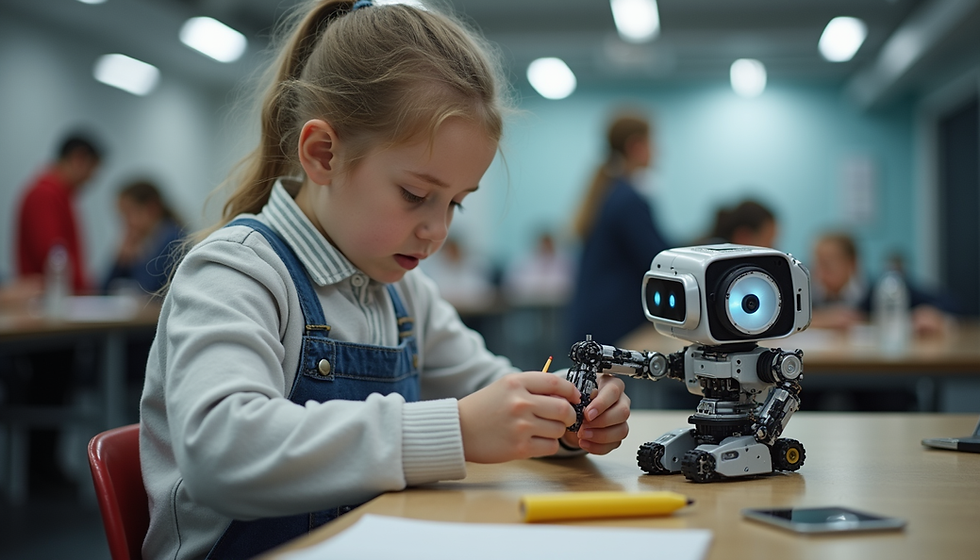Cultivating a Global Mindset in STEM Education Inspired by Germany's Innovation Culture
- Nov 10, 2025
- 3 min read
Innovation is often linked to technology, but it is equally about mindset. Germany’s success in technology and engineering comes from a culture that values curiosity, precision, and collaboration. These qualities have shaped a strong foundation for innovation that goes beyond gadgets and software. They offer valuable lessons for STEM education, especially for children who will become tomorrow’s creators.
Bringing this culture into classrooms can help young learners develop a global mindset while building skills locally. This post explores how Germany’s approach to innovation can inspire STEM education and prepare kids to think broadly and act effectively.

How Curiosity Drives Innovation in Germany
Curiosity is the starting point of every invention. In Germany, curiosity is encouraged from an early age, not just in schools but in society. Children are taught to ask questions, explore how things work, and experiment without fear of failure.
For example, Germany’s famous “MINT” education (Mathematics, Informatics, Natural sciences, and Technology) promotes hands-on learning. Students build models, conduct experiments, and solve real-world problems. This approach helps children connect theory with practice and sparks their interest in STEM fields.
In STEM education, fostering curiosity means creating environments where kids feel safe to explore and make mistakes. Teachers can encourage this by:
Offering open-ended projects that allow creative problem-solving
Using everyday objects to explain scientific concepts
Encouraging questions and rewarding effort, not just correct answers
By nurturing curiosity, educators help children develop a mindset that looks beyond immediate results and values discovery.
Precision and Quality as Foundations of Learning
Germany’s reputation for precision is well known in industries like automotive and manufacturing. This focus on quality is not just about products but also about processes and education.
In STEM classrooms, precision translates to attention to detail and thorough understanding. German schools emphasize mastering fundamentals before moving to complex topics. This method builds confidence and competence.
Teachers can apply this by:
Breaking down complex problems into smaller, manageable steps
Encouraging students to check their work carefully
Using tools and materials that require accuracy, such as coding platforms or robotics kits
Precision helps children develop discipline and pride in their work. It also prepares them for future challenges where accuracy can make a difference between success and failure.
Collaboration as a Key to Innovation
No innovation happens in isolation. Germany’s tech success is partly due to strong collaboration between universities, companies, and government institutions. This network creates a supportive ecosystem where ideas can grow and improve.
In STEM education, collaboration teaches children how to work with others, share ideas, and build on different perspectives. Group projects, peer reviews, and team challenges are effective ways to develop these skills.
For example, schools can:
Organize STEM clubs where students collaborate on projects
Use pair programming or group coding exercises
Invite guest speakers from local tech companies to share experiences
Collaboration also introduces children to diverse viewpoints, helping them think globally while acting locally.
Bringing Germany’s Innovation Culture into STEM Education
To cultivate a global mindset inspired by Germany’s innovation culture, educators and parents can focus on three main areas:
Encourage curiosity by creating open, exploratory learning environments.
Promote precision through structured lessons and attention to detail.
Foster collaboration with group activities and community involvement.
These elements help children become creators who understand the importance of quality and teamwork while thinking beyond borders.
Programs like CreatorBots, which combine coding, robotics, and creative problem-solving, reflect this approach. They teach kids to build solutions that matter locally but can have global impact.
Preparing Kids for a Connected Future
The future belongs to those who can think globally and build locally. Germany’s innovation culture shows that success comes from combining curiosity, precision, and collaboration. STEM education that embraces these values prepares children not just to use technology but to create it responsibly and effectively.
By adopting these principles, educators can help children develop skills and mindsets that will serve them in a rapidly changing world. This approach supports lifelong learning and encourages young innovators to contribute meaningfully to their communities and beyond.
Explore how curiosity, precision, and collaboration shape innovation and how these values can transform STEM education for kids. The future is in the hands of creators who understand the world and build solutions that matter.







Comments